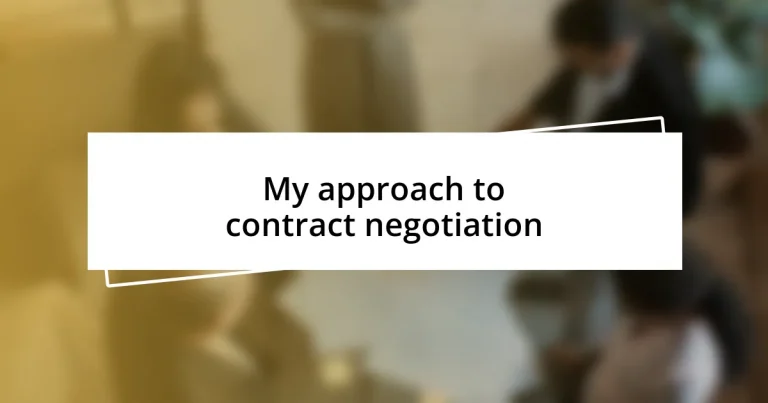Key takeaways:
- Understanding contract negotiation is about relationship-building and listening to the other party’s needs for a win-win outcome.
- Thorough preparation, including market research and practicing delivery, sets a confident tone for negotiations.
- Employing active listening, remaining flexible, and utilizing emotional intelligence are key strategies for effective negotiation.
- Closing successfully involves summarizing agreements, expressing gratitude, and evaluating outcomes for future improvements.
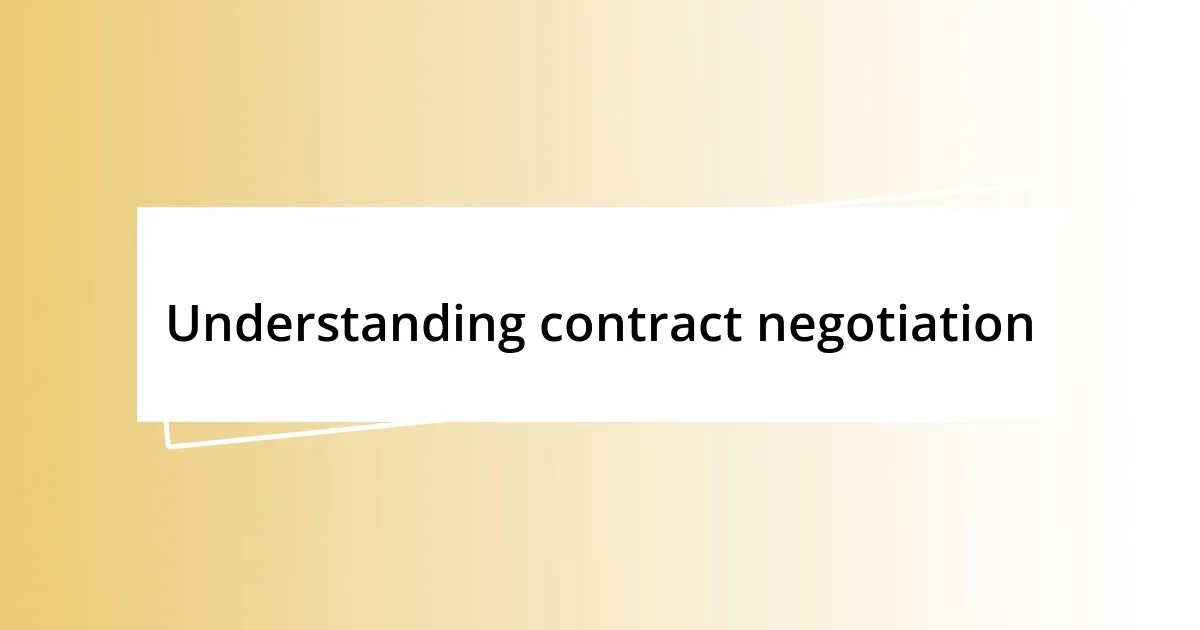
Understanding contract negotiation
Understanding contract negotiation goes beyond just exchanging terms; it’s a dance of relationship-building and mutual respect. I remember a particularly tense negotiation where we were at a standstill over a simple clause. It struck me how vital it was—not just to advocate for my position, but to truly listen to the other side. This moment reminded me that understanding their needs and emotions could pave the way for a win-win outcome.
Have you ever felt the weight of a contract hanging over your head? I often find that the emotional stakes can overshadow the logic of the negotiation process. When I approach a negotiation, I strive to create a collaborative atmosphere, where both parties feel heard and valued. This emotional connection can alleviate stress and lead to more creative solutions that might not be evident in a strictly adversarial setting.
From my experience, preparation is crucial. The more I understand the nuances of what is being negotiated, the more effectively I can communicate my position. I’ve learned to ask clarifying questions and seek out feedback during discussions. It’s remarkable how this not only clarifies the objectives but also fosters a spirit of cooperation that often leads to better results for everyone involved.
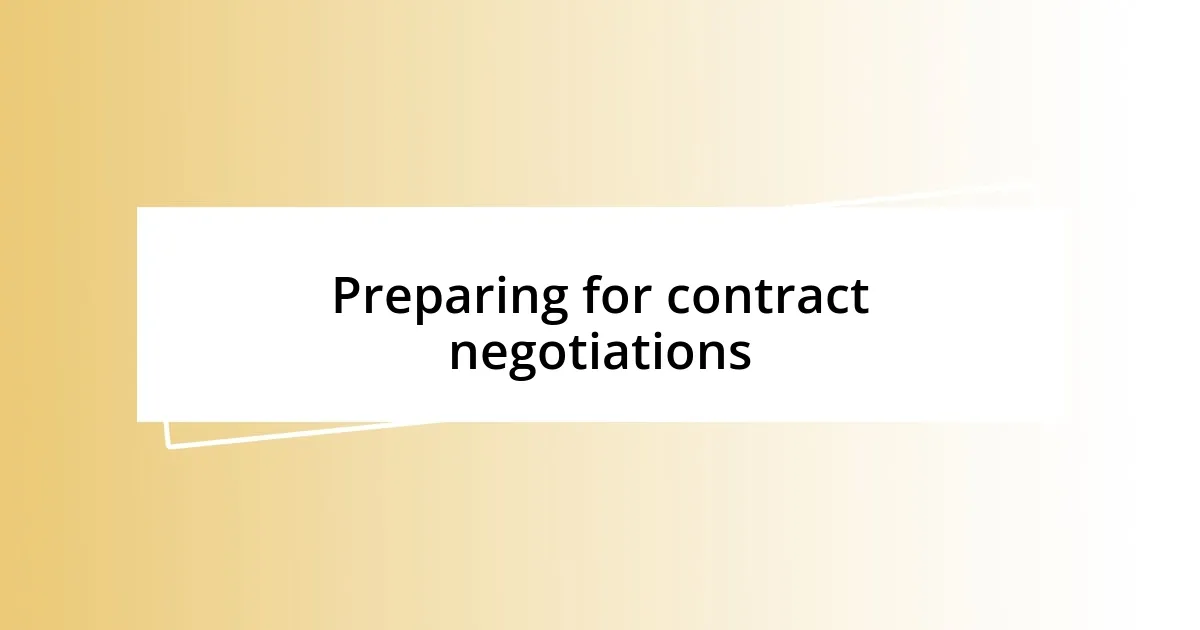
Preparing for contract negotiations
Before diving into contract negotiations, I always invest time in thorough preparation. In my experience, knowing every detail of the agreement gives me a solid foundation to build upon. I recall a time when I landed a significant deal simply by understanding market trends and the other party’s previous contracts. This insight allowed me to make informed suggestions that resonated with their goals, ultimately leading to a smoother negotiation process.
Here are some key steps I take while preparing:
- Research the market: Understand industry standards to frame your expectations realistically.
- Know your priorities: List what elements are non-negotiable and what can be flexible.
- Anticipate objections: Think about potential pushbacks and prepare your responses in advance.
- Clarify your objectives: Be specific about what you want from the negotiation.
- Practice your delivery: Role-playing negotiations with a trusted colleague can enhance confidence.
By following these steps, you not only equip yourself with vital knowledge, but you also set a tone of confidence and competence that the other party is likely to respect.
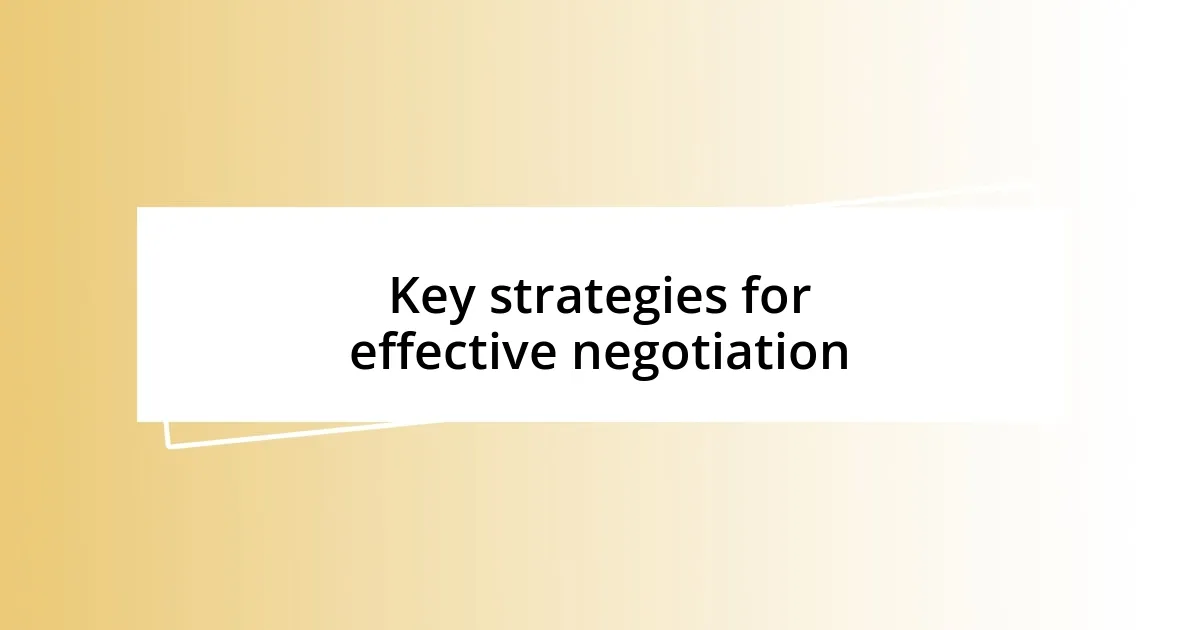
Key strategies for effective negotiation
When negotiating, employing active listening is one of the key strategies I have found invaluable. While it might seem simple, truly hearing what the other party is saying can drastically shift the dynamics. I remember a particular negotiation where the other side expressed frustration over certain terms. By acknowledging their concerns, I could propose an alternative that met their needs without compromising my interests. This mutual respect not only facilitated a smoother negotiation but also built a rapport that could benefit future interactions.
Another effective strategy I’ve utilized is to remain flexible and open to creative solutions. There was an instance where the main issue seemed to be an inflexible deadline that both parties were fixated on. Instead of persisting, I suggested a phased approach, allowing for staggered deliverables. This thought-provoking pivot not only resolved the impasse but also showcased my willingness to collaborate, making the other party more amenable to concessions down the line. It’s a reminder that negotiations aren’t always about rigid terms but rather about finding pathways that benefit all involved.
Finally, the power of emotional intelligence in negotiations cannot be overstated. Often, it’s not just about the facts on the table but how the parties feel throughout the process. I once experienced a tense negotiation, and I carefully observed the other party’s body language and tone. Acknowledging their undercurrents of anxiety with empathy fostered a more relaxed environment. Understanding that emotions drive decisions can change the outcome significantly, enabling a productive dialogue that leads to lasting agreements.
| Strategy | Description |
|---|---|
| Active Listening | Truly hear and acknowledge the other party’s concerns to build rapport. |
| Flexibility | Be open to creative solutions and alternatives that may satisfy both sides. |
| Emotional Intelligence | Understand and manage emotions to enhance communication and dialogue. |
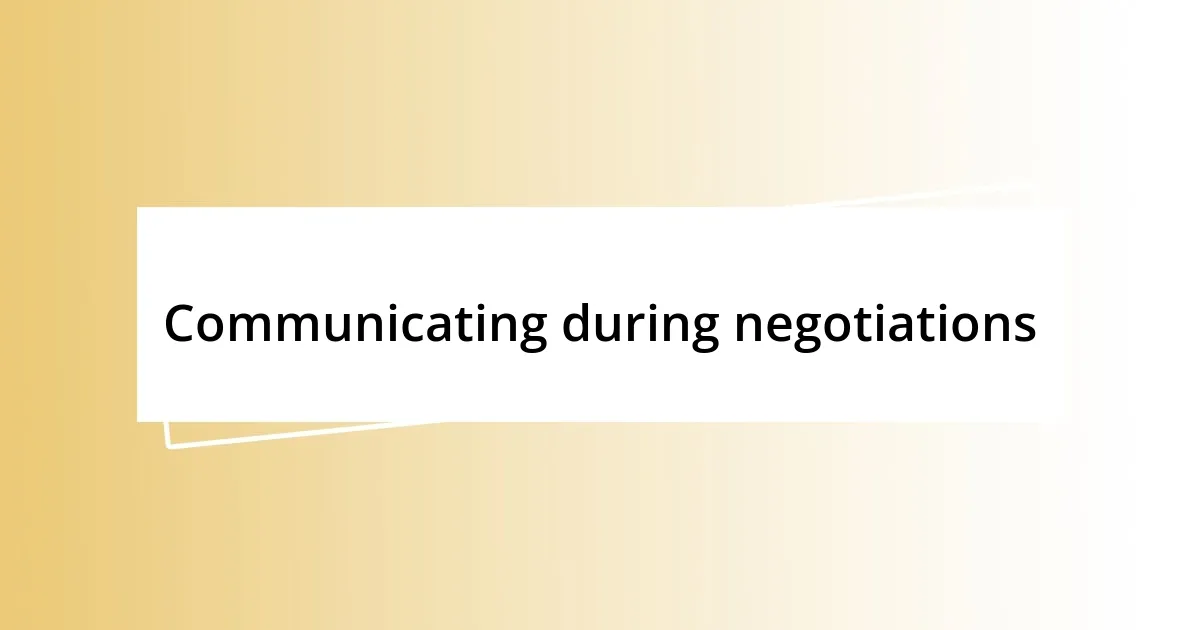
Communicating during negotiations
During negotiations, I’ve discovered that clear and concise communication is crucial. I recall a time when I was approaching a particularly complex deal; I made it a point to periodically summarize key points to ensure everyone was on the same page. It’s fascinating how just a few clarifying statements can reduce misunderstandings, isn’t it? This technique not only helped avoid miscommunication but also reinforced a sense of teamwork among the parties involved.
When I engage in negotiations, I always pay close attention to non-verbal cues as well. Have you ever noticed how much is conveyed through body language? In one instance, while discussing sensitive terms, I saw my counterpart’s posture tense up slightly. Recognizing this, I decided to pause and ask if they had any reservations. This openness led to a fruitful dialogue where we could address potential issues before they escalated, deepening our connection and understanding.
I find that empathy plays a significant role in effective communication during negotiations too. One memorable experience I had was when a key stakeholder expressed frustration with the timeline of our project. Rather than brushing off their concerns, I acknowledged their worries and shared my own challenges. This vulnerable exchange not only humanized the negotiation but also built trust, turning what could have been an adversarial moment into a collaborative problem-solving discussion. Have you ever tried this approach? It can really transform the energy in the room.
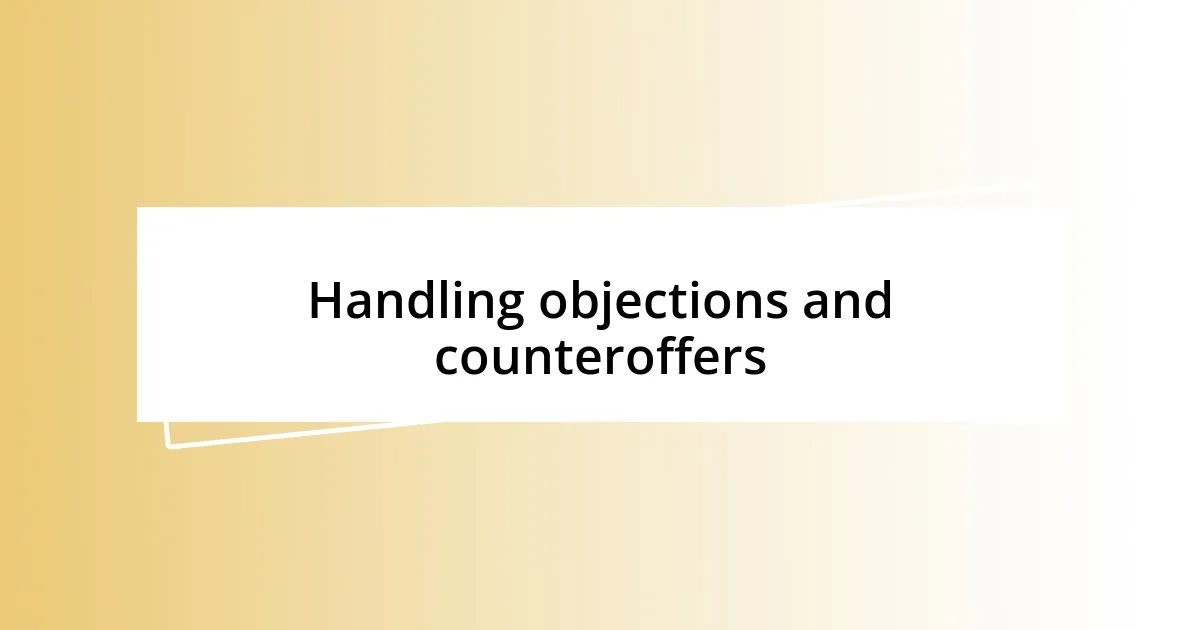
Handling objections and counteroffers
Handling objections and counteroffers in negotiations often requires a calm and strategic approach. I recall a situation where my initial proposal was met with a firm rejection. Instead of getting defensive, I took a deep breath and asked them, “What specifically concerns you about my offer?” This open-ended question allowed me to uncover their underlying worries and pivot the conversation toward a more collaborative atmosphere.
Counteroffers can feel daunting, but I’ve learned the importance of viewing them as opportunities rather than obstacles. In a deal with a client, they proposed a lower fee that initially caught me off guard. However, instead of viewing this as a roadblock, I explored what was driving their budget constraints. By mutually exchanging ideas, we were able to reach a compromise that preserved the value of my work while accommodating their needs. Isn’t it fascinating how discussing financial limits can actually open up new avenues for negotiation?
Emotional resilience plays a crucial role when navigating objections. There was a time when my proposal was criticized extensively, and my first reaction was to feel disheartened. However, I reminded myself that objections are a natural part of the process and can lead to valuable insights. By maintaining my composure and responding with curiosity—“What aspects do you think could be improved?”—I transformed an uncomfortable moment into a productive dialogue. This experience taught me that embracing objections can lead to stronger solutions that benefit both parties involved.
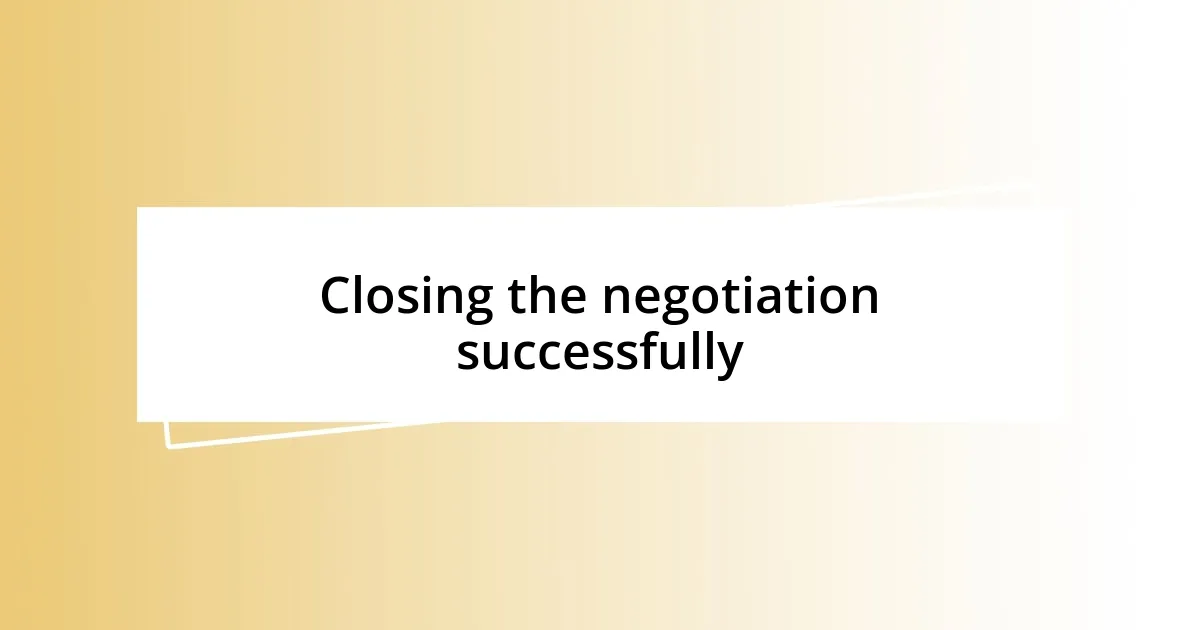
Closing the negotiation successfully
Closing a negotiation successfully is truly an art form, one that often hinges on the subtle cues at the end of the discussion. I remember a situation where, after a lengthy back-and-forth, I sensed that the other party was ready to agree but needed a final affirmation. I leaned in, smiled, and said, “It feels like we’re almost there. What do you think about wrapping this up?” The relief in their expression told me I’d hit the right note, creating a warm atmosphere that led us right to the finish line.
In another instance, I found that summarizing the main points before getting to the sign-off made a world of difference. I shared a brief recap of what we had agreed upon, highlighting the benefits for both parties. Have you ever noticed how a well-structured summary can clarify lingering doubts? It not only instilled confidence in my counterpart but also reinforced our mutual commitment, paving the way for that all-important handshake.
Lastly, I’ve learned that expressing gratitude can solidify that successful close. After finalizing a deal, I always take a moment to thank everyone involved for their effort and collaboration. There was a time when I ended a negotiation without this gesture, and I could feel a sense of dissatisfaction linger in the room. Now, I ask myself—how often do we underestimate the power of appreciation? A heartfelt thank you creates a positive lingering impression and sets the tone for future partnerships, which I believe is invaluable in building long-lasting business relationships.
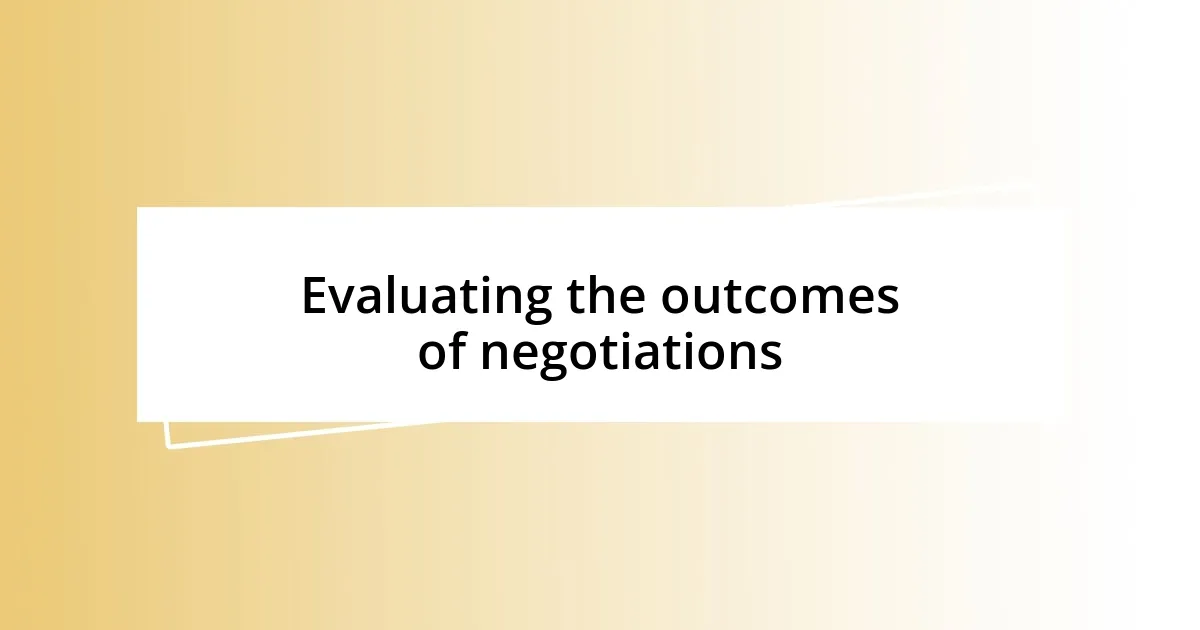
Evaluating the outcomes of negotiations
Evaluating the outcomes of negotiations is often more nuanced than simply deciding who won or lost. I recall a negotiation where I believed I had clinched the deal, only to find the other party dissatisfied afterward. This experience taught me that success goes beyond the immediate agreement; it’s about ensuring both sides feel valued and understood. Have you ever left a negotiation feeling uneasy despite a signed contract?
As I reflect on past negotiations, it strikes me how vital it is to revisit the objectives we set. For instance, in a contract with a vendor, I initially focused solely on cost savings. However, when I took the time to evaluate the relationship post-negotiation, I realized the long-term value of a reliable partner far outweighed the immediate financial gain. This shift in perspective allowed me to foster a stronger collaboration, aligning our goals rather than just tallying negotiable elements. In your approach, what metrics do you prioritize?
Ultimately, I believe that conducting a post-negotiation analysis can illuminate areas for growth and improvement. After one particularly intense negotiation, I sat down to assess what worked and what didn’t. Not only did this reflection enhance my negotiation tactics, but it also deepened my resilience to setbacks. Taking the time to evaluate outcomes encourages a mindset geared toward continual growth. How do you approach your post-negotiation reflections to ensure you’re always improving?












